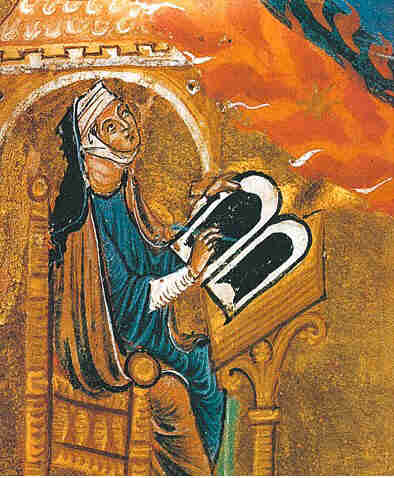Hildegard of Bingen (September 17): Psalm 104:25-34; Sirach 43:1-12; John 3:16-21
Morning Prayer – Pee Dee Deanery Convocation (Reflection begins at 16:45.)
In the Name of the Father, the Son, and the Holy Spirit – Amen
Good morning. Today we celebrate Hildegard of Bingen (Bing-uhn). Hildegard lived in the 1100s and was from the town of Bingen located in southern Germany on the Rhine River.
In Church history, the 1100s was one of those times when the institutional church was in crisis. The ordained leadership from deacons to popes owed their office more to politics than any real spiritual calling.
The church was inward-looking and concerned primarily with maintaining the institution. Little care was given to making disciples or restoring all people to unity with God and each other in Christ. Little care was given to teaching the love of Jesus or really any ministry to the laity or those who did not work within the institutional church itself.
What we see in the 1100s, however, is a great outpouring of the Holy Spirit beyond the clergy and the walls of the church building. Today we celebrate Hildegard. She was a woman. She was not ordained clergy (the church didn’t allow that back then). And yet she went out in southern Germany and Switzerland, preaching and teaching the gospel message of the reconciliation of God and humanity through Jesus Christ. She was a mystic who proclaimed the power of the Holy Spirit both in her life and in the world. She was investigated by the pope (she was a woman teaching after all) who, having read one of her sermons, encouraged her to write them down and have them published. She also wrote poems and songs, and even a manual on nutrition and building design.
In Hildegard, we have someone whom the Holy Spirit raised up to give witness to the Light that has come into the world. Or as the Psalmist says, “You send forth your Spirit, so you renew the face of the earth.” In Hildegard, we see what this renewal looks like.
In some ways, our church is in a similar crisis. We do have great ecclesiastical leadership (finally). But, as we seek to rebuild from the Late Unpleasantness, our churches suffer from a lack of full-time clergy, many of us have lost our places of worship, and our budgets are a shadow of what they used to be.
But like Hildegard, we too are empowered by the Spirit. The Bishop will tell you (I hope) that she is not the chief minister of the Diocese of SC. And Fr. Wilmont (I hope), will tell you that he is not the chief minister of St. Stephens NMB. Rather, what they will tell you, is that you – the laity – are the chief ministers of the Diocese and of your congregations. Hildegard was part of the laity, and yet she went out and witnessed to the light of Christ within a hurting world.
If you will, please turn to page 855 of the BCP. The catechism tells us this –
| Q. | What is the ministry of the laity? What is your ministry? |
| A. | The ministry of lay persons is to represent Christ and his Church; to bear witness to him wherever they may be; and, according to the gifts given them, to carry on Christ’s work of reconciliation in the world. |
In John 14, Jesus does not tell us that he will send us bishops (no offense), or priests, or buildings, or budgets. Rather he says that he will send us the Holy Spirit. And, as we see on Pentecost, it is the Holy Spirit that gives us, the laity, the power to use our gifts, to go out into the world, and to bear witness to the Light of Christ in our words and in our deeds, and to carry out Christ’s work of reconciliation. Through the Spirit, we too are called to bring renewal, not to the whole world, but to our local communities – to Florence, Cheraw, Sumter, or Conway. It is you who the Spirit is calling. It is you who the Spirit is working through if we but pay attention and allow her to work.
I want to end with one of Hildegard’s meditations. She writes:
“Listen: there was once a king sitting on his throne. Around him stood great and wonderfully beautiful columns ornamented with ivory, bearing the banners of the king with great honor. Then it pleased the king to raise a small feather from the ground, and he commanded it to fly. The feather flew, not because of anything in itself but because the air bore it along. Thus am I, a feather on the breath of God.”


Pingback: Everywhere You Look, Ch.5: The Parish is the Unit of Change, pt.1 – Ancient Anglican